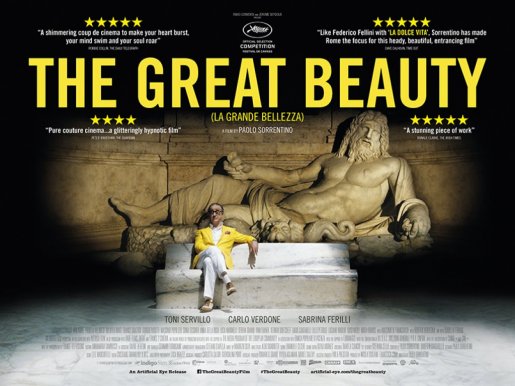Film Review: The Great Beauty


It is now more than fifteen years since the victory of Roberto Benigni 's unforgettable Life is Beautiful . On Sunday, in Hollywood, an Italian film came back to triumph in the Best Foreign Film category. And it did it after bringing home the same award at both the Golden Globes and BAFTAs in the weeks before. This is The Great Beauty, the new film by Paolo Sorrentino.
The film recounts the story of Jep Gambarella, a journalist and theatre critic (played magnificently by Tony Servillo, at this moment the best actor that Italian cinema can offer) and also the writer, in his youth, of a single novel The Apparatus Human.
The journalist, a man of great charm, immerses himself in the beauty of Rome's great past, whilst at the same time busying himself with the mundane events of the city. He attends every evening salon in the capital, jumping between parties vulgar and poor taste, along with his circle of friends.
Jep, by now lazy and impatient, understands that in his life there is nothing left to believe, and reduces its existence to a single purpose: "not to slip into the mundane of the mundane".
However it is precisely whilst coming back from one of his squalid gatherings, when he meets a man who is waiting for him. He is the husband of Elisa, the only woman the journalist has ever loved. The woman died, leaving behind her a diary which tells the story of her undying love for Jep.
This episode (and his 65th birthday) leads Jep to a deep and long retelling of his life. From here, a series of events lead Jep to do what he has not been able to for many years: write a new book.
This film raises Sorrentino and Servillo (as well as the rest of the excellent cast) to the elite of Italian cinema. Equally, the cinematography of the film is absolutely superb, and the images of Rome which pass by in the background remain in the memory of viewer for a long time.
The themes reflect on what is now Italy, a country full of contrasts and beauty, with its glorious past, but also with all the problems that it faces today.
Rome itself, shining in the eyes of the viewer, is full of facets, with the vestiges of its glorious past, but saturated with all its modern contrasts. There is the feel of a latent crisis throughout the film, at various levels, both the socio-psychological and cultural.
Watching this movie immediately brings to mind The Sweet Life by Fellini, but the difference between the two films is resoundingly deep. The cast characters of Fellini's are able to convey to the spectator their emotions. In The Great Beauty it is the coldness of the characters (to themselves and others) that shines through, at the will of the director.
What everyone is asking is: will Italian cinema have to wait another 15 years to be able to create another film with such ambition to succeed?








